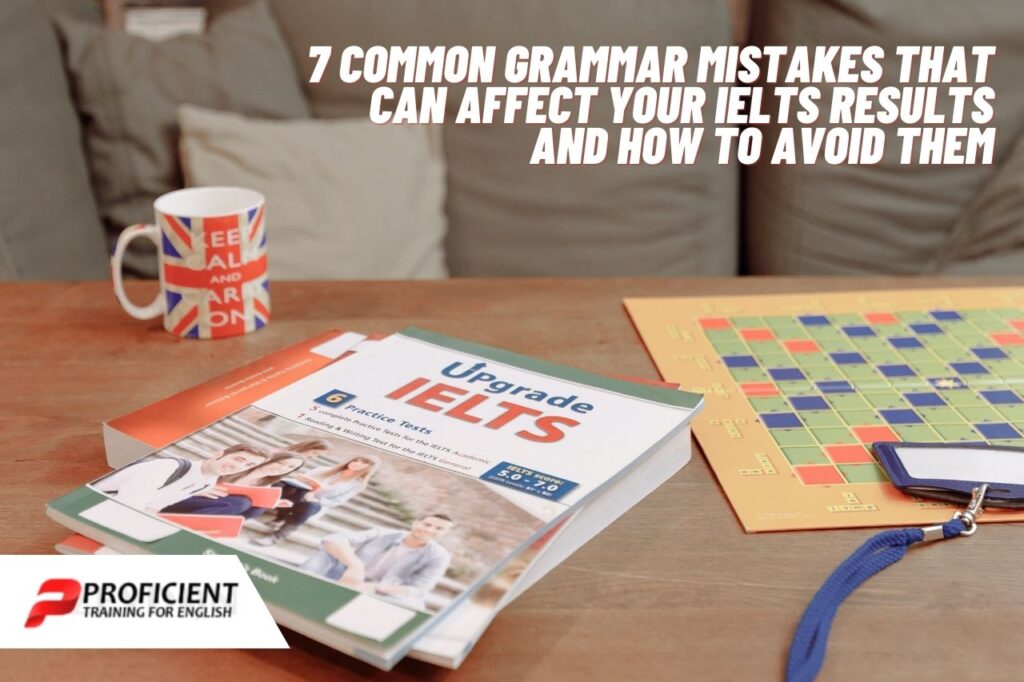What are the grammar mistakes that pull your IELTS results down? Experts say, a 9 band scoring candidate also makes unknowing errors, but they are vigilant on commonly made mistakes and so their unknowing slips are unnoticed at times. Grammar mistakes are easy to commit, but requires learned skill to cover up.
Grammar drives the accuracy of what you write and what you speak. Eventually, in IELTS results writing and speaking grammar have a huge impact. Examiners pay attention to your grammar mistakes as they mark you. To completely make your writing and speaking error-free sounds impossible. However, avoiding simple mistakes to the best of your ability is no biggie, right?
Let’s shed light on the 7 most common IELTS grammar mistakes and how to avoid them.
1. Putting ‘The’ At Wrong Places
Although we have been learning where to use “the” since school, it still hides behind the curtain of most grammar mistakes, which is certainly unhealthy for IELTS results. Let’s take a quick learning lesson here. ‘The’ is used before:
a) Specific nouns: The red dress, The white paper.
b) Superlatives: He is the best architect we have!
c) Cardinal numbers: She is the third most powerful woman in the world.
d) Names of places implicating a group of islands or states: The United States of America
e) Something unique in the world: The moon shined for her
Even after mugging this, practice will take you closer to the perfection of how and when to use ‘the’.
2. Verb Not Agreeing With Noun
Sentence like:
‘Cheerleaders dances on every goal’, is wrong
Here, the verb ‘dances’ is only used when the noun is singular. The correct sentence would be:
‘Cheerleaders dance on every goal’.
The subject-verb agreement is an important aspect. One way to avoid it would be proofreading. Skimming through your essay after you are done writing, you may notice verbs that do not make sense with the noun. To correct these sentences in time, assign 5 minutes exclusively to recheck all sentences.
3. Giving Plural Form To Uncountable Nouns
Uncountable nouns cannot be measured. Words like knowledge, education, advice, travel, shopping, sadness, work, research, etc. should always be expressed in a singular form.
For example, it is improper to use words like 6 advice, many sadness, 2 work.
4. Use of comma in wrong places or not at all
Many grammar mistakes revolve around the usage of commas. Commas do not necessarily join sentences. Precisely, they indicate the reader should take a brief pause in an ongoing sentence. Commas are conventionally used while mentioning many substances, short sentences, phrases, or ideas.
Especially after words like however, still, somehow, nevertheless, etc., a comma is expected.
5. Wrong use of Prepositions
Prepositions like at, with, in, on, of may get confusing after some point. Reading books, novels, articles, newspapers, and online reading material will give a glimpse of which preposition sounds right after what noun. For example, you can be happy with someone and not happy at someone, you can be surprised at the party and not surprised on the party.
6. Incorrect Usage of Apostrophes
Apostrophes are mostly used in two scenarios:
a) While describing someone’s ownership or possession: Arabella’s home, Sam’s mom
b) While contracting word: Can’t (cannot), wasn’t (was not), isn’t (is not)
Majority, confuse the use of the apostrophe between two plural nouns.
These are the boys’ books rather than these are the boy’s books.
How to avoid this is simply practicing and referring ‘Higher standard English grammar books’. A quick review of your write-ups can save your marks.
7. Silly Spelling Mistakes
Non-native speakers often confuse themselves with two words that sound the same, but both mean and spell differently. For example. To have and too have both different spelling and meaning, writing one of them instead of the other can refer to a completely different thing than the other.
Some words are:
a) There and their
b) Principle and principal
c) Though and through
Are these errors only made by non-natives? Sometimes you will hear even natives making these grammar mistakes unknowingly. Few grammar errors you make in the IELTS exam may not significantly affect your score, but some of them might drastically affect your IETLS score! Here are our IELTS experts who will guide you in detail about these grammar errors. Apply for PTE’s online IELTS classes today!
